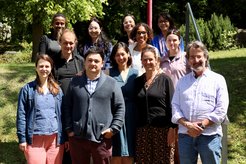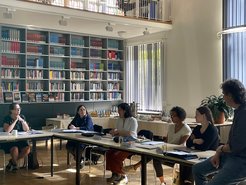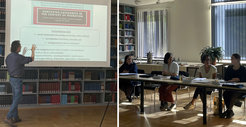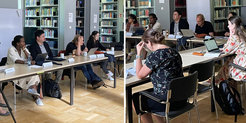Contested Categories in the Context of Migration: A Writing Workshop
by Ulrike Bialas and Johanna M. Lukate

From May 31 to June 2, Ulrike Bialas, Johanna Lukate, and Steven Vertovec hosted a writing workshop for the contributing authors of their co-edited Special Issue on “Contested Categories in the Context of Migration”, forthcoming with Ethnic and Racial Studies. The authors were selected from over 230 submissions, which we had received in the winter of 2022/2023, following a panel discussion on “Contested Categories in the Context of Migration” at the 2022 IMISCOE conference in Oslo and a subsequent call for abstracts in October 2022. During the three-day workshop, the authors and guest editors engaged in in-depth discussions about state categories alongside Cecilia Menjívar, the immediate past president of the American Sociological Association, who will be contributing an Afterword to the Special Issue.

The writing workshop marked the midpoint between authors learning they would be part of the special issue and submitting their full manuscripts. While some authors had already completed full drafts of their articles, others came to Göttingen with only a rough outline and many questions for their fellow writers. After a warm welcome by the institute’s founding director and co-editor of the special issue, Steven Vertovec, the workshop participants were joined by John Solomos, the editor-in-chief of Ethnic and Racial Studies, who spoke remotely about the Do’s and Don’ts of putting together a special issue and the intricacies of academic publishing. The workshop itself was divided into four thematic sessions: Categorization & Migration in a Historical Perspective, Categorization & Migration Journeys, Categorization & Identification, and Categorization & Resistance. Each session comprised two or three articles and concluded with a general discussion, where the authors, Cecilia Menjívar, and the co-editors (Ulrike Bialas, Johanna Lukate, and Steven Vertovec) identified cross-cutting themes among the articles and explored some of the compelling questions that arise from the concurrent study of categorization and migration: Why and how do states categorize migrants? How do state and social categories intersect and interact? What are possibilities for resistance?

Over the course of three days, the workshop participants engaged in lively debates as they discussed research papers on topics ranging from a historical analysis of Korean migrants and students traversing migration statuses in the US at the time of the Asiatic Barred Zone, an ethnographic look at contemporary category switching on the Sudan-Ethiopia border, and the role of legal, political, and discursive categorisation in Indigenous migrants’ rights in Brazil. During the workshop, we engaged in 1-hour-long discussions of each of the ten papers. To facilitate structured feedback and offer authors the opportunity to benefit from an early review of their manuscript or ideas for a manuscript prior to undergoing peer review, each author had to review the outlines or manuscripts of two other contributions. Following a 10-minute introduction to the paper offered by the author, the two reviewers then shared their review of the outline or manuscript, before we opened the floor to everyone. This format proved particularly productive and the enthusiasm, dedication, and willingness of the authors to contribute their outlines and manuscripts as well as offer kind, critical feedback to their co-authors made this workshop a truly enriching experience.

As scholars and editors, we care deeply about the consequences of categories in people’s lives – consequences that are often particularly far-reaching for migrants in vulnerable life phases and under intense scrutiny by receiving and, as we learned during the workshop, sending states. Therefore, we aim for this special issue to deeply and carefully engage with processes of state categorization and reflect a true exchange between early career, mid-career and senior scholars working on different regions (including Brazil, Ethiopia, Germany, Malaysia, Mexico and the United States of America) and times (historical versus contemporary); employing different methods from single case studies to interview studies and archival research, and focusing on various state and legal categories and scales of categorization, from supranational organizations to street-level bureaucrats on the ground. The academic publishing business, with its solitary working conditions, tight deadlines despite unpredictable timelines, and the prospect of harsh reviewers, rarely allows for such conversations. By centering individual authors rather than the demands of a publishing house or the whims of a reviewer, we hope to contribute to a “slow scholarship” that ultimately leads to better scholarship and remains relevant in the years to come.
We hope this special issue will receive wide engagement!
















